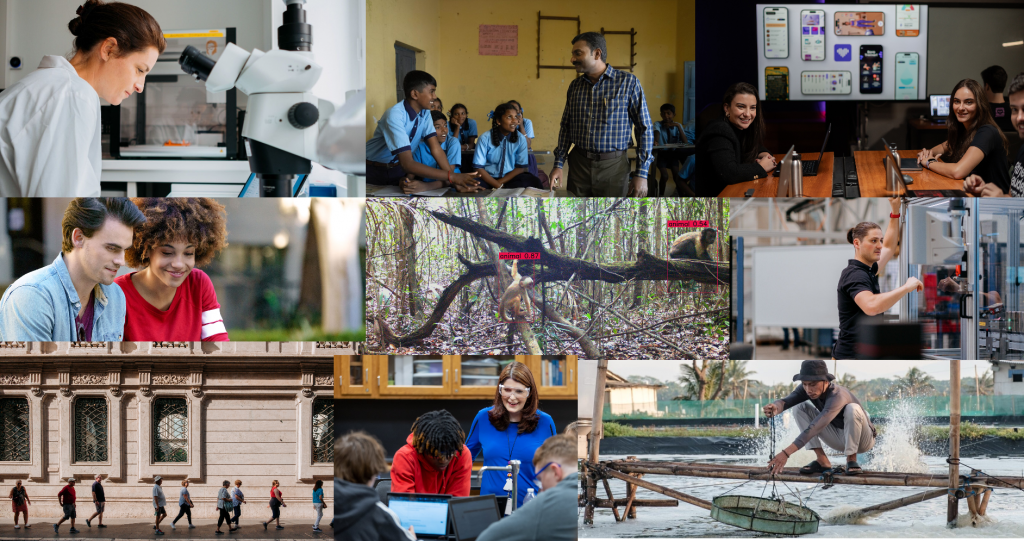Unveiling the Transformative Impact of AI Across Various Sectors in 2024
The rapid advancement of Artificial Intelligence (AI) over the past year has been nothing short of extraordinary. As we reflect on 2024, the most striking aspect is the swift integration of AI technologies across different sectors globally. This article explores some significant developments that have harnessed AI’s potential to drive innovation and efficiency.
AI Revolutionizing Cancer Research at Institut Curie
Institut Curie has a storied history in cancer research, tracing back to its founder, Marie Curie, over a century ago. Today, the institute is embracing cutting-edge AI technology to enhance its research capabilities. In collaboration with Microsoft and Witivio, Institut Curie is developing the Copilot for Researcher, an AI-driven tool designed to streamline administrative tasks. By automating routine processes, the tool frees researchers to focus on groundbreaking ideas in cancer treatment and prevention. This advancement not only accelerates research but also exemplifies how AI can enhance productivity in complex scientific fields.
Bridging Skills Gaps in Manufacturing with AI
In the world of manufacturing, companies like Siemens and thyssenkrupp are leading a technological revolution. Traditionally, the gap in skilled labor has posed challenges, but AI is bridging this divide. Utilizing Siemens Industrial Copilot, powered by Microsoft’s Azure OpenAI Service, thyssenkrupp is transforming how machinery is programmed and operated. This AI-driven interface allows engineers to interact with machines more intuitively, enhancing productivity and reducing the skill barrier. Such innovations underscore AI’s potential to revolutionize industries by making complex processes more accessible.
Enhancing Tourism in Rome with AI Assistants
As Rome prepares for the 2025 Jubilee, expected to attract an additional 35 million visitors, AI is playing a pivotal role in enhancing the tourist experience. The city has introduced a virtual assistant named Julia, designed to assist travelers in navigating Rome’s rich cultural heritage while alleviating congestion at popular sites. This AI-driven initiative represents a quiet revolution in tourism, where technology enhances visitor experiences by providing personalized and timely information. Such applications demonstrate AI’s capacity to transform public sector services, making them more efficient and responsive.
Streamlining Education in India with AI
In the educational sector, AI is making a significant impact in India, where teachers are utilizing the Shiksha copilot to streamline lesson planning. Developed by Sikshana Foundation in partnership with Microsoft Research India, this AI tool reduces preparation time for lessons from hours to minutes. It integrates activities, videos, and assessments, tailoring them to available resources. Part of Microsoft’s wider Project VeLLM, this initiative aims to make generative AI tools accessible to various sectors, highlighting AI’s potential to enhance educational outcomes by enabling teachers to focus on teaching rather than administrative tasks.
Enhancing Aquaculture in Indonesia with AI
In Indonesia, shrimp farmers are leveraging AI to maintain the delicate balance needed for healthy aquaculture. Shrimp require precise conditions, and an AI assistant provided by aquaculture startup eFishery, powered by Azure OpenAI Service, assists farmers in monitoring and adjusting these parameters. Accessible via a mobile app, this AI solution exemplifies how technology can support traditional industries by optimizing processes and boosting productivity.
Revolutionizing Student Enrollment in South Africa
Eduvos, a South African educational institution, has dramatically improved its student enrollment process using Microsoft Dynamics 365 and Azure. By automating and streamlining enrollment, the time required has been reduced from 90 days to nearly instant, cutting associated costs by 90%. This transformation showcases AI’s potential to enhance administrative efficiency in educational institutions, offering students a smoother and more accessible experience.
Combating Deforestation in the Amazon with AI
The Guacamaya Project, a partnership between Microsoft and Colombian organizations, is utilizing AI to combat deforestation in the Amazon rainforest. By employing AI models tailored to the Amazon ecosystem, the project enables faster analysis and response to environmental threats. This initiative highlights AI’s potential in sustainability efforts, where timely data and insights can drive effective conservation strategies.
Promoting Health and Wellness in Brazil with AI
RadarFit, a Brazilian tech startup founded by women entrepreneurs, is using AI to promote health and wellness. Through a gamified app, it encourages healthy habits among employees by tracking metrics such as nutrition, hydration, and physical activity. This approach transforms wellness into an engaging experience, demonstrating AI’s ability to influence lifestyle changes positively.
Expanding Educational Access with Khan Academy and Microsoft
Khan Academy is partnering with Microsoft to expand access to AI tools that enhance teaching and learning. By integrating Azure AI-optimized infrastructure, they aim to provide free access to AI tools for K-12 educators in the U.S., empowering teachers to deliver personalized and engaging lessons. This collaboration exemplifies how AI can be leveraged to enrich educational experiences, making learning more interactive and enjoyable for students.
In conclusion, the advancements in AI across various sectors in 2024 illustrate its transformative potential. From healthcare and manufacturing to education and sustainability, AI is driving innovation and efficiency, enhancing our ability to tackle complex challenges. As these technologies continue to evolve, their impact will undoubtedly expand, offering new opportunities to improve our world. For more detailed insights into these developments, you can explore the original articles on the source website.
For more Information, Refer to this article.


































